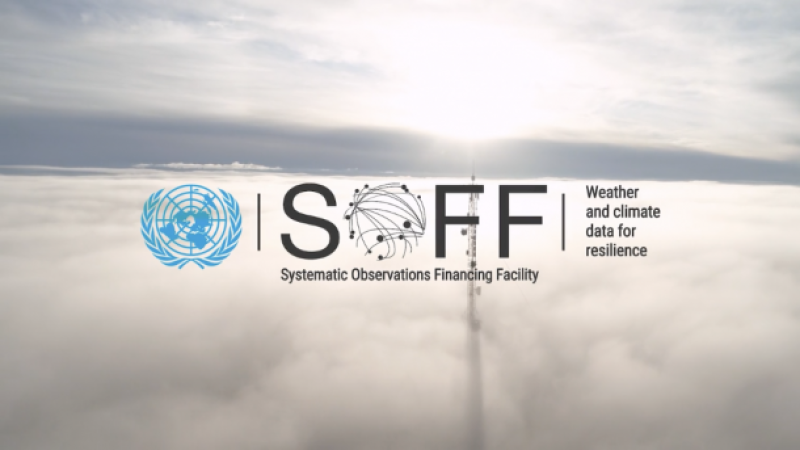

SOFF - The partners of the Systematic Observations Financing Facility (SOFF) met at a high-level event at the United Nations Climate Change Conference COP27 to mobilize additional funding to ensure that the most vulnerable countries have the means to acquire and exchange the essential weather and climate data that underpins all adaptation efforts.
Sharm el-Sheikh, Egypt, 9 November 2022. SOFF focuses on supporting Small Island Developing States (SIDS) and Least Developed Countries (LDCs) to close the large gaps in basic weather and climate data which are essential to forecasts, build climate resilience and to ensure effective implementation of the new Action Plan to ensure that everyone on Earth is protected by early warnings in the next five years.
“We must invest equally in adaptation and resilience. That includes the information that allows us to anticipate storms, heatwaves, floods and droughts”, United Nations Secretary-General Antonio Guterres told the World Leaders Summit at COP27 in reference to the Early Warnings for All Action Plan.
“Early warning systems save lives and protect livelihoods. We must work to scale up SOFF in support of the Secretary-General’s Early Warning Systems for All Initiative as an urgent priority." stated Selwin Hart, the United Nations Special Adviser to the Secretary-General on Climate Action and Just Transition.
SOFF provides long-term technical and grant-based financial assistance to enable countries to acquire and internationally exchange basic weather and climate data. It was established at COP26 in 2021 by the World Meteorological Organization (WMO), the United Nations Development Programme (UNDP), and the United Nations Environment Programme (UNEP) as a United Nations Multi Partner Trust Fund (UNMPTF). One year later, SOFF is fully operational.
“Today, less than 10% of required basic weather and climate observations are available from Small Island Developing States and Least Developed Countries” WMO Secretary-General Petteri Taalas told the SOFF high-level event at COP27. SOFF is vital to fast-track implementation of the internationally agreed Global Basic Observing Network – GBON).
“Better global forecasts enable better local forecasts, applications and services that, in turn, can be used to prepare for extreme events and plan for specific environmental conditions and this ultimately benefits everybody” explained Florence Rabier, Director-General of the European Centre for Medium-Range Weather Forecasts.
Target to support 100 countries
As integral part of the Executive Action Plan of the Early Warnings for All initiative, SOFF has an ambitious target to support 100 countries in the next five years. 65 SIDS and LDCs with technical assistance, investments, and open-ended results-based funding and 35 ODA-eligible countries with technical assistance. Earlier this month, the SOFF Steering Committee selected the first 26 countries that will receive SOFF support.
Mozambique’s Minister of Transport and Communication, Mateus Magala, welcomed the start of SOFF support in these countries and encouraged funders and implementing partners to rapidly move ahead with SOFF implementation in all SIDS and LDCs.
SOFF and its funding partners are rapidly stepping up their efforts
Eight initial partners have already made a financial contribution to the SOFF UN Fund: Austria, Denmark, Finland, Iceland, Ireland, Norway, the United States and the Nordic Development Fund that serves as a co-chair of the SOFF Steering Committee. And support is growing at COP27. Earlier this week, Spanish President Pedro Sanchez announced a financial contribution from his country, and Anne Beathe Tvinnereim, Minister of International Development declared that Norway will substantially increase its contribution.
Monica Medina, United States Assistant Secretary of State for Oceans and International Environmental and Scientific Affairs emphasized that “strengthening and sustaining climate data is critical if we want to provide high-quality climate information and early warnings at the local level where adaptation takes place. The United States is proud to support the Systematic Observations Financing Facility in filling observation gaps around the world.”
Speaking at the event, Inger Andersen, UNEP Executive Director thanked all partners for their support thus far and urged other potential funders to follow with concrete commitments: “If we back SOFF, we can save lives, protect assets and property and foster economic growth in the countries suffering most from climate change. This is solidarity and climate justice in action”.
Weather data are economic data
The event provided an opportunity to highlight the value of basic weather and climate data for the global economy.
Kristalina Georgieva, Managing Director of the International Monetary Fund, keynote speaker at the event, said “In the new climate economy, weather data are an important component of economic data and collecting and sharing this information is absolutely vital. Better data will improve climate models and climate risk assessments, and it will mean better targeting for critical adaptation investments”.
These data are also critical for the private sector. The CEO of the Africa Risk Capacity, Lesley Ndlovu, joined the event to emphasize the urgent need to fill these data gaps to ensure the effectiveness of disaster risk management and financing in Africa. In recognition of the foundational value of this data for more reliable and cost-effective responses to climate shocks and disasters, and sustainable resilience-building, SOFF formally joined the InsuResilience Global Partnership.
Sigrid Kaag, Minister of Finance of the Netherlands and co-chair of the Coalition of Finance Ministers for Climate Action highlighted the importance of weather and climate data for effective economic decision-making. The importance of improving basic weather and climate observations will be on the agenda for the Coalition’s event on 10 November, co-hosted with WMO.
Advocating a Global Goal on Observation
SOFF partners gathered at the event are also working together to reflect the importance of systematic observation of the climate to meet the Paris Agreement adaptation goal. As part of the presentation of the 2022 Implementation of Plan of the Global Climate Observing System, at COP27, a Global Goal on Observation and sustainable financing for its implementation, including through SOFF is being promoted at COP27 deliberations. This will contribute to ensure that the pressing needs for systematic observation in highly vulnerable countries are rapidly addressed.
Originally published on www.wmo.int